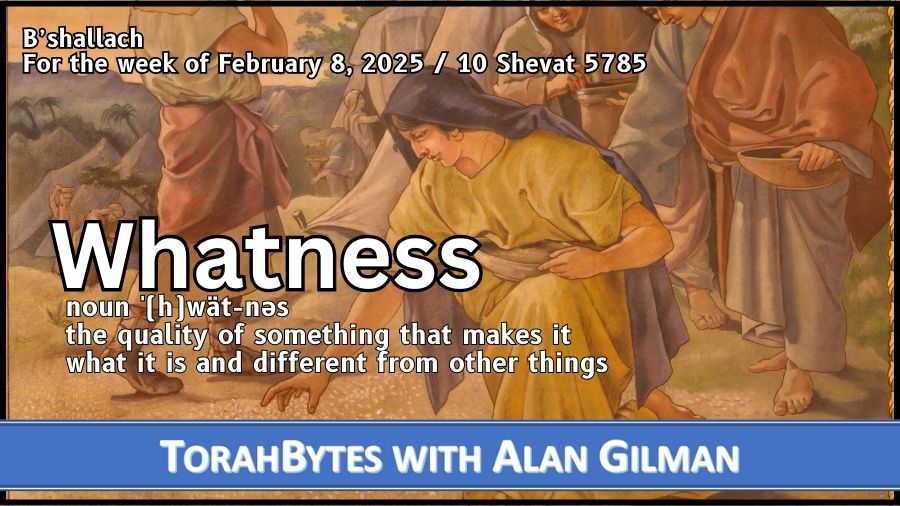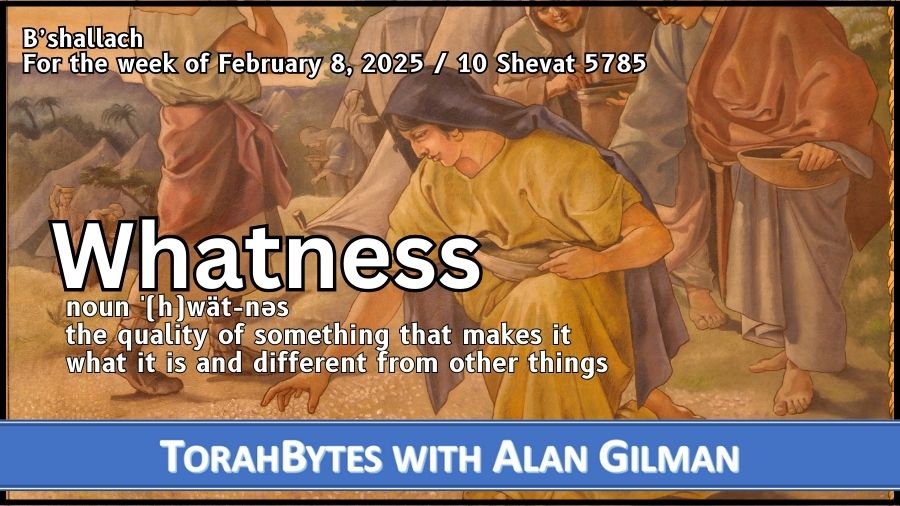
Whatness
For the week of February 8, 2025 / 10 Shevat 5785

B’shallach
Torah: Shemot/Exodus 13:17 – 17:16
Haftarah: Shoftim/Judges 4:4 – 5:31
When the people of Israel saw it, they said to one another, “What is it?” For they did not know what it was. And Moses said to them, “It is the bread that the LORD has given you to eat. (Shemot/ Exodus 16:15)
As I was looking over this week’s parsha (weekly Torah reading portion), the story of the manna caught my eye, which led me to check out its Hebrew background. The very popular Strong’s concordance of the Bible[1], includes a suggested definition for the supposed root of the word “manna” as: “literally, a whatness (so to speak).”[2]
According to the Cambridge Dictionary, “whatness” is “the quality of something that makes it what it is and different from other things.”[3] Take trees, for example. A tree’s whatness is its unique combination of attributes that makes it distinct from other things, such as a root system, trunk, branches, leaves or needles, and perhaps especially its woodiness. Strong’s use of “whatness” for the manna is especially interesting because it’s in a category all its own. It cannot be grouped together with anything else in existence. Therefore, its “whatness” is found solely in its relation to itself. In other words, it is what it is.
When the people of Israel first encountered the manna, they were dumbfounded. They had never seen anything like it. That’s because there wasn’t anything like it. Eventually, they would discover it didn’t behave like anything else in all creation. If they took too much for their family between the first and fifth days of the week, it would go bad. And yet, on the sixth day, they were to take double the daily amount since none would appear on Shabbat, the seventh day. This would continue for forty years until they entered the Promised Land when it abruptly stopped. As far as we know, manna is the only food substance to have ever existed that provided everything needed, in addition to water, for a human’s daily nourishment. None of this would have been known to the Israelites on the first day they encountered it. But they knew it was something most special. They looked at it. They touched it. They tasted it. And all they could say was something like, “What?”
Many theologically minded people like the concept of “mystery” to describe the unknowns of God and life. Regarding the manna, its whatness, that which makes it what it is, might be described as a mystery. Indeed, much of what makes manna manna is beyond our understanding, but that should not be a barrier to truly experiencing it to its fullest extent. And that goes for both those who literally partook of it and the rest of us who encounter it in Scripture.
The manna didn’t only sustain the people of Israel for forty years in a most inhospitable environment; it demonstrated God’s provision and was designed to teach the people to rely on God’s Word. As we read:
And he humbled you and let you hunger and fed you with manna, which you did not know, nor did your fathers know, that he might make you know that man does not live by bread alone, but man lives by every word that comes from the mouth of the LORD (D’varim/Deuteronomy 8:3).
To understand the essence of the manna was not to be found in its unknowns but in its knowns, its profound and complex whatness. I wonder how often we miss God’s own whatness because we can’t figure him out or understand what’s happening. But should we allow our inability to understand God and life to get in the way of our fully experiencing him? Perhaps you are in a situation right now that makes you want to say, “What?” If so, may God help you see it for what it is so that it can accomplish what God wants in and through you.
Scriptures taken from the English Standard Version
[1] “A concordance is a comprehensive index of the words used in a text or a body of texts. Ordinarily it will not only index but also cite all passages in which a given word occurs” (https://guides.library.queensu.ca/english/concordances-quotations).
[2] https://www.blueletterbible.org/lexicon/h4478/nasb20/wlc/0-1/
[3] https://dictionary.cambridge.org/dictionary/english/whatness